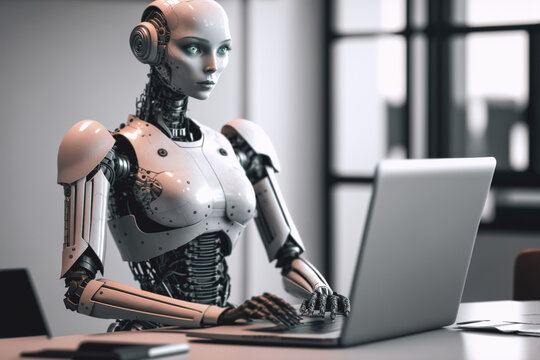
If AI was a whisper two weeks ago, it’s become a Wilhelm scream over the last two days. That’s because with screenwriters striking, everyone wants to know if the studios are going to turn to AI to write their scripts. Let’s be honest. This is the dream of every studio in town. To be able to generate scripts without dealing with pesky neurotic inconsistent writers who never entirely deliver on what the studios wanted in the first place.
Can you imagine if you didn’t need to hire and fire Damon Lindelof for the next Star Wars movie? You could merely go to an AI chat bot, feed it an idea, and have the script written in 98 seconds? And pay nothing in the process. That sounds like a sweet deal to me. In fact, we can get a preview of what that script looks like right here. I’m going to prompt Chat GPT to write the opening scene of the recently announced Rey movie.
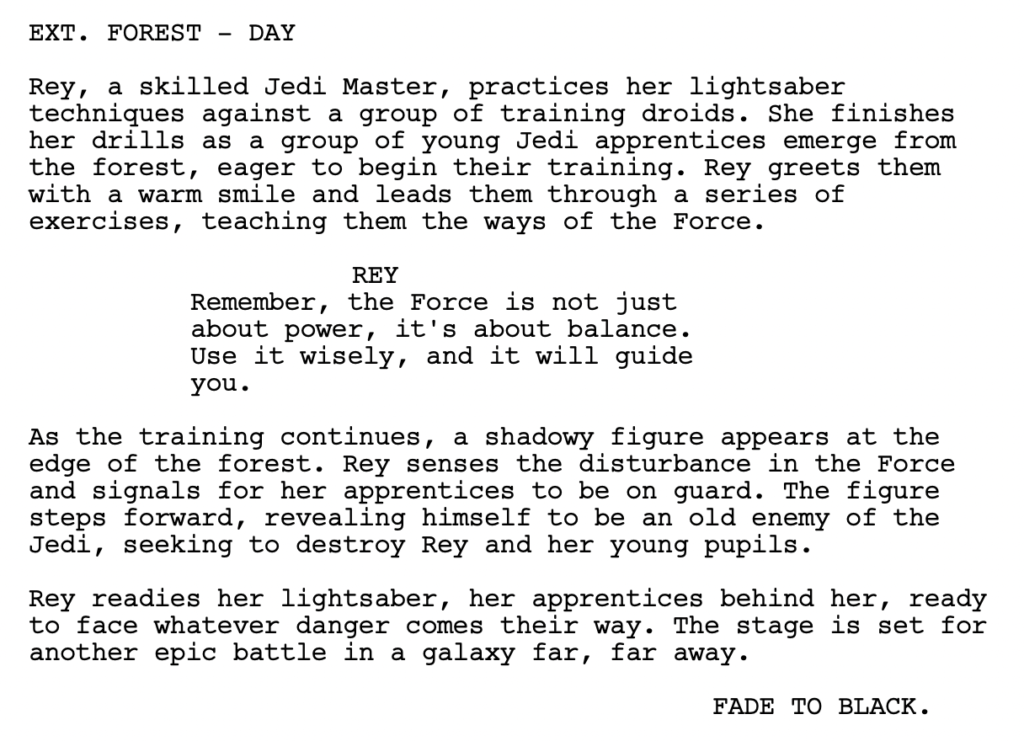
Riveting stuff there, Chat GPT.
I’m here to tell you that AI has no chance of replacing screenwriters. And I’ve got five ironclad reasons why.
It Doesn’t Know How To Be Funny
AI has no concept of humor. Which makes sense. AI is a logic-driven process. It crunches data and approximates how to use said data to give the user his desired result. It’s very nuts & bolts. It doesn’t do funny. And if you can’t do funny, you eliminate a gigantic component of screenwriting.
Even if you’re not writing a comedy, you need to inject humor in places. You’ll always have at least one character who’s comedic. The screenwriters who get the most attention are the ones who have strong voices, and “voice” is synonymous with how a writer uses humor.
I prompted Chat GPT to write a new Seinfeld scene. Jerry and the gang have found his apartment transported to the future, in 2023, and they’re trying to get back to 1992. For clarity’s sake, I prompted GPT to have them already in the future. Yet is still started like so…
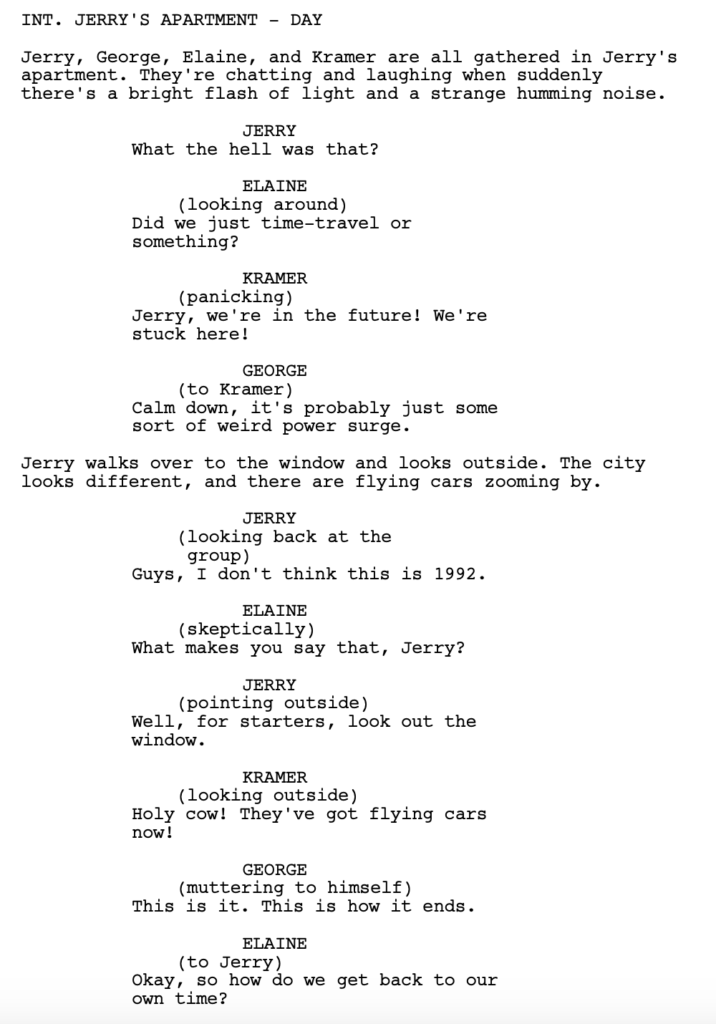
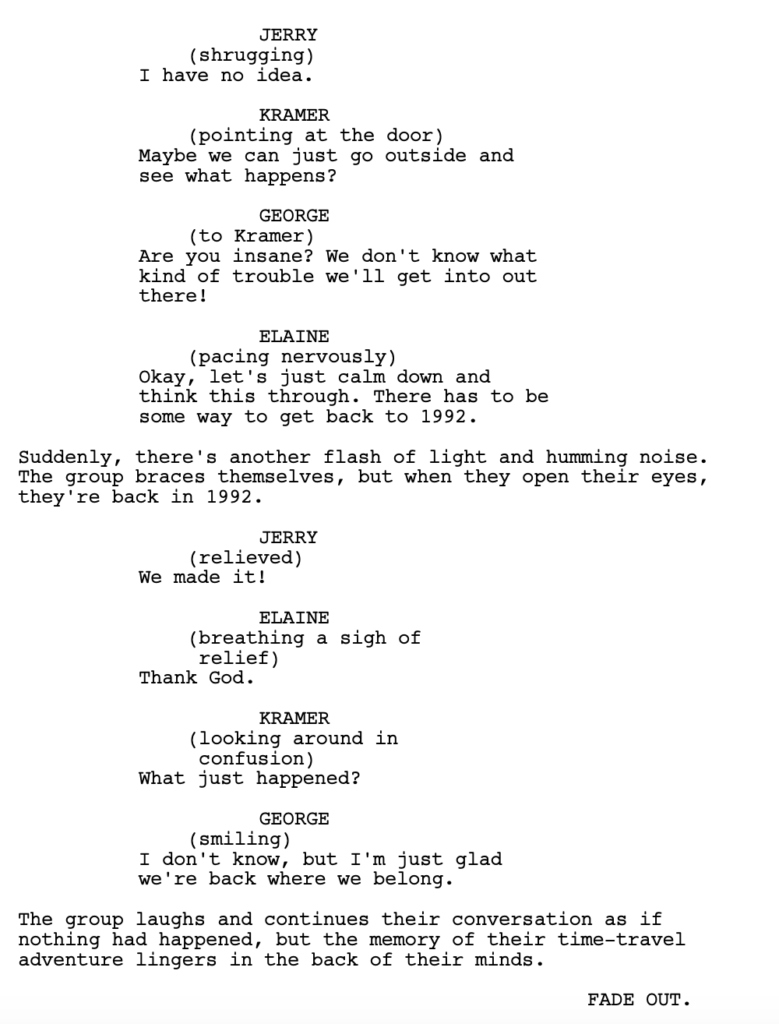
And this is a sitcom that Chat GPT already has tons of data for. So it knows the characters and the kinds of episodes that are written and where the laughs usually come from. Even with all that data, that’s the best it could do. Now let’s see what happens when I tell it to write the same scene with a totally original sitcom, where it has to make up everything. Here’s what it gave me.
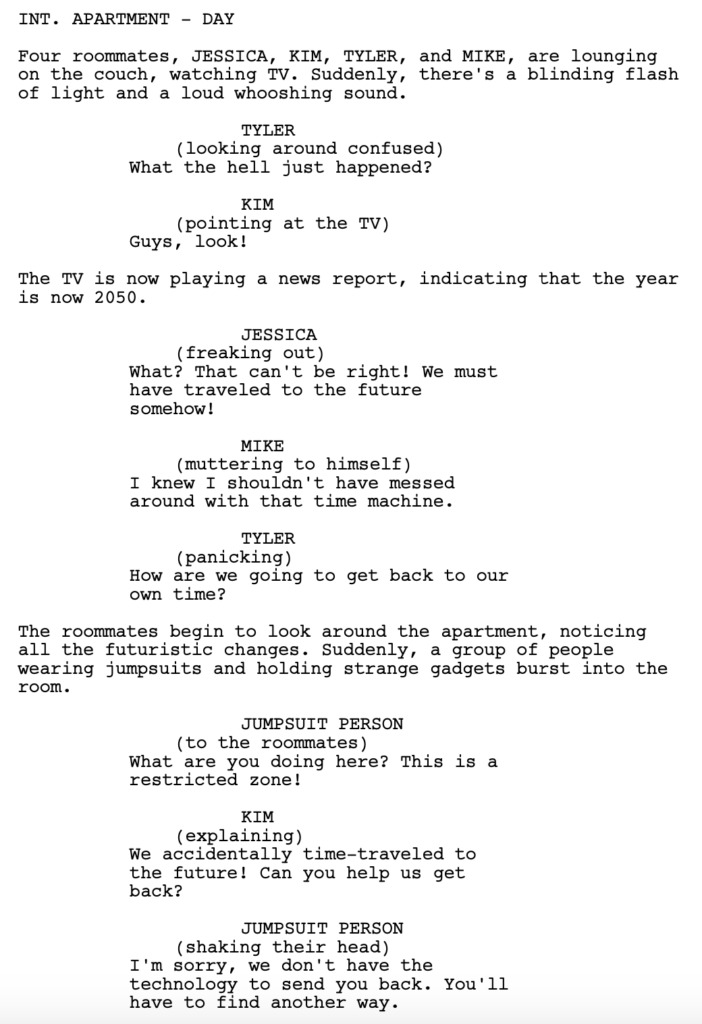
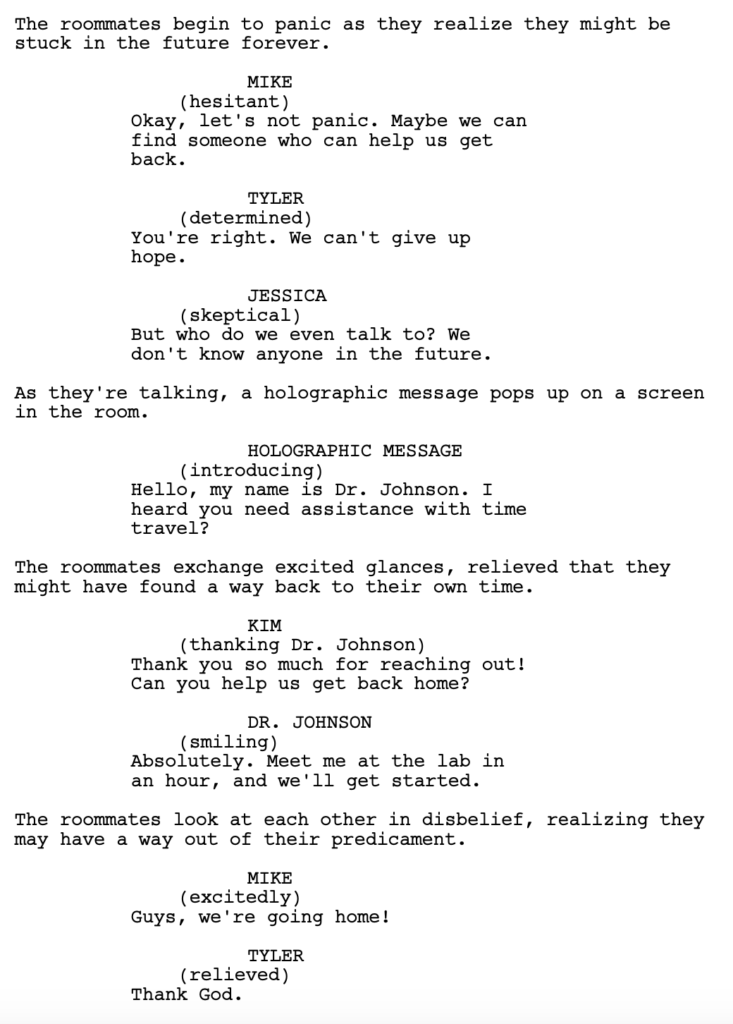

I don’t think there’s even an attempt at a punchline in this scene. It’s safe to say that comedy is the first area where screenwriters are safe.
How Can Something That Isn’t Human Document The Human Experience?
Every story that has ever been written is a reflection of the universal human experience. When someone writes about love, it reflects their own experiences with love. When someone writes about the devastation of losing a loved one, it’s because, either directly or indirectly, they have experienced that feeling of loss. Heck, when someone writes about losing their virginity, they are drawing upon their own experience of losing their virginity.
How can a computer ever cover these things in an authentic way? This is the secret sauce in screenwriting that you don’t really think about. You need to bare your soul in your writing if you want your stories to resonate with others. Neil Gaiman talks about this. That nobody paid his writing any attention until he started writing “the truth.” The truth being our true life experiences, the ugly stuff we’re ashamed about, the things we’re embarrassed of, the messy stuff that occupies the shadows and crevices of our existence. That’s what makes a story connect with other people.
I’ve been watching the Hulu show, Dave, lately. It follows a rapper trying to make it big. Dave spends a lot of time in his show focusing on his insecurities about his body, particularly in relation to sex. There’s a lot of fear and shame and confusion that occurs whenever he has sex. That’s an exclusively human thing that a computer could ever replicate. Why? Because a computer has never had to go through that before.
It’s a Litigation Nightmare
The dirty little secret about AI’s journey into art is that it steals. It says it doesn’t. It says everything it generates – pictures, paintings – all comes from its “imagination.” But a funny thing happened not long ago. Someone prompted the AI to generate a photo of a slide tackle in soccer. It came up with this.

Look a little closer. You see something there in the middle right side? It almost looks like a watermark. Here’s another REAL photo that happened to already be on the internet.

Looks similar huh? And what’s that there? Is that a Getty watermark? Ahhhh-haaaaa. Looks like we just caught AI in a big fat case of plagiarism. Obviously, AI is taking real photos and real paintings to create art. It’s stealing. And you can bet your bottom dollar that the second AI “writes” some scene into a movie that’s eerily similar to a scene from an unsold screenplay on the internet, or even a scene from another produced movie, that that studio is going to get sued up the wazoo.
This is going to happen with characters, scenes, concepts, dialogue. They could potentially get sued from two-dozen different directions if you believe that AI is crowd-sourcing data from every corner of the web to come up with their screenplays.
If you’re a studio, why put yourself in that position? Just buy a single writer’s script and you don’t have to worry about any of that.
Its Costs Are Going to Skyrocket
Recently, it was discovered that AI used Reddit as a huge language source for the way it thinks and acts. So Reddit said, we’re not just going to give you that data. We’re going to charge you for it. This is going to be a business that explodes over the next few years.
Every single company, Reddit, CNN, the New York Times, Twitter, Instagram, blogs — anything that has lots of data – is going to start charging AI to use it. Which means AI is going to have to pass those costs on to others. YOU. You’re going to have to start paying for AI. And for every corner of the internet that AI will have to pay money to use, those costs to the consumers are only going to rise.
What that means is that a producer is not just going to be able to get a Chat GPT screenplay for free. They’re going to have pay for it. And the costs are going to keep getting higher as people figure out how AI is getting its information and making sure that they have to pay to get that information.
It Cannot Offend
This is the whole ball of wax, as far as I’m concerned. It’s the smoking gun as far as why screenwriters will never have to worry about AI replacing them.
AI cannot offend. It’s not allowed to. It’s being reprogrammed EVERY SINGLE DAY to be less offensive than the day before. This is happening because the AI companies are terrified of AI saying something offensive. Because that means THEY’RE offensive. And they can’t let that happen.
The thing about writing is, if you want to write anything that has any sort of power to it, it’s hard to do so without offending someone.
AI could not have written Inglorious Basterds. German people could say it’s offensive and stereotypes them. AI could not write The Whale. It’s offensive towards overweight people. It would refuse to write Veep, as there’s way too much swearing and mean-spiritedness. It wouldn’t write Academy Award winning Promising Young Woman, as the subject matter of rape and revenge are tricky to navigate and may trigger someone. It couldn’t write 13 Reasons Why. The series might cause someone to commit suicide. It would refuse to adapt Anna Karenina, as there are no people of color in that story. It couldn’t write Beef because the show routinely makes Asian-Americans look dangerous and incompetent. It couldn’t write Super Mario because Italians don’t want to be stereotyped as cartoon plumbers.
American Beauty, Doubt, The Hunger Games, Jojo Rabbit, Get Out, Mad Men, Joker, Three Billboards, Spotlight, The Passion of the Christ, Room, Silver Linings Playbook, American Sniper, South Park, Deadpool, The Sopranos, Vicky Cristina Barcelona, Juno, Crash, White Lotus, Suicide Squad, both the British and American Office.
AI would not have touched a single one of those stories as they each have something in them that could potentially be perceived as offensive.
I’m not even convinced it could write Top Gun Maverick, as the bad guys are vaguely implied to be Russian, and the AI would refuse to stereotype an entire nation.
What this means is that AI would only be able to write the most vanilla of vanilla screenplays. The safest of the safe. You wouldn’t feel a single emotion because AI would go out of its way to avoid anything that might cause emotion!
People have said, “Yeah, but AI is only going to get better.” That’s true. But we’re also only going to get more sensitive. So it doesn’t matter how good it gets if it still has to avoid ten million offensive pitfalls every time it writes a screenplay.
The only entities who can write stories are people because people are still allowed to shine a light on the dark crevices of life. People are allowed to shine a light on the corruption inside the Catholic Church. People are allowed to write a pro-life movie like Juno and tackle the contentious underbelly of that subject matter. People are allowed to highlight the kinds of inadvertently offensive people who we find ourselves around every day, like Michael in The Office. AI is not allowed to do that. Which is why writers will always be safe.
Wrapping this up, do I think that AI could come up with a really clever plot like the movie, “Missing,” which I just watched? Do I think it could come up with a whopper of a twist, like “The Sixth Sense?” I honestly don’t know. I think it has a better chance of figuring out how to plot a movie since plotting is technical.
But plot is so closely interwoven with character. And “character” is the thing that I don’t think AI will ever figure out. Because it’s elusive. You can’t come up with a mathematical equation to write a great character. And, like I said earlier, AI doesn’t understand the human condition. It can’t. It’s never lived a human life. For that reason, every screenwriter in Hollywood can sleep soundly. You’re not going to be replaced.

